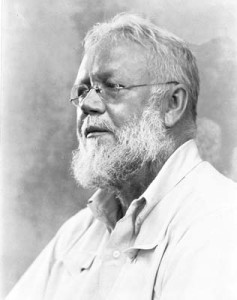Fessenden, Reginald Aubrey
Reginald Aubrey Fessenden, (1866-1932), was a remarkable Canadian  who, at the age of 24, had been head chemist to Thomas Edison. He was Professor of postgraduate Mathematics and Electrical Engineering, Western University of Pittsburgh and Engineering Commissioner, Ontario Power Commission. While there he took on the challenge of wireless communication and he made his first radio voice ‘broadcast’ on Christmas Eve, 1906, at a time when Marconi was still signalling in Morse code. In fact, his first voice transmission was on December 23rd 1900 which was heard one mile away.
who, at the age of 24, had been head chemist to Thomas Edison. He was Professor of postgraduate Mathematics and Electrical Engineering, Western University of Pittsburgh and Engineering Commissioner, Ontario Power Commission. While there he took on the challenge of wireless communication and he made his first radio voice ‘broadcast’ on Christmas Eve, 1906, at a time when Marconi was still signalling in Morse code. In fact, his first voice transmission was on December 23rd 1900 which was heard one mile away.
Fessenden investigated an ancient civilisation in the Caucasus and identified it as Atlantis. The famous Egyptologist Flinders Petrie was interested in his work, which revealed evidence that people from the Caucasus had an influence on the development of ancient Egyptian culture(b). Dr Margaret Murray (1863-1963), who worked with Petrie, was also sympathetic to this view. More recently, Ronnie Gallagher has taken up this cause(c) and has gone further by suggesting the possibility that not only were migrants from the Caucasus responsible for kick-starting the development of Egyptian culture but that people from the same region had a similar influence on the early inhabitants of Sumeria and the Indus Valley.
Fessenden approached the Smithsonian seeking help with organising an expedition to Russia to search for evidence in support of his theories. Their response of March 1924 is available online(e).
Fessenden was also the author of The Deluged Civilisation of the Caucasus Isthmus published in three parts between 1923 and 1933 and now available on the Internet(a). In this extensive work, he discusses an alternative interpretation of the geography of early Greek myths and its consequences for Plato’s story of Atlantis.
>The journal Nature published a very brief review of Fessenden’s work in the 20th Dec. 1924 edition(g).
Fessenden’s monumental work on the civilisations of the Caucasus concludes with a short paper having the interesting title of Synopsis of Some Unpublished Chapters of the Deluged Civilization of the Caucasus Isthmus he notes a number of intriguing points, keeping in mind that this was written nearly a century ago.
“The names of the gods of the Babylonian Creation legend, i.e. Lakamu, Lakmu, Kingu, Anshar, An, Marduk, Gaga, are the names of the most prominent mountains of the Caucasus range. The names are all unchanged except Kingu, now Elbruz, and Anshar, now Kasbek; whose old names are given in the Encyclopedia Britannica, article “Caucasus”.
Almost all of these names are very distinctive and are found nowhere else, e.g. Lakamu, Gaga, etc., though Kingu is found as Kongur on the shore of Lake Sevanga. In addition, their characteristics correspond with those of the gods. For example, Kingu is the greatest, Anshar next, then An; and Marduk is near Anshar, and Gaga is a smaller mountain between Marduk and Terek. The Apsu was the crest of the range.” (f)
He also identified the Jakin or eastern Pillars of Hercules as shown on one of Adolf Stieler’s maps on the old shore of the Caspian Sea and furthermore, he quoted from Encyclopedia Britannica, ‘Babylonia’ where similarities between the names of locations in Babylonia and Finland are noted!<
In 1940, Fessenden’s widow, Helen, just a year before her own death, completed Reginald’s unfinished autobiography [1615]. In Chapter 28, his support for Atlantis being situated in the Caucasus is reiterated.
Jason Colavito has written a short critique of Fessenden’s work(d).
(a) https://www.radiocom.net/Deluge/Deluge1-6.htm
https://www.radiocom.net/Deluge/Deluge7-10.htm
https://www.radiocom.net/Deluge/Deluge11.htm
(b) https://www.jasoncolavito.com/flinders-petrie-on-atlantis.html
(c) https://grahamhancock.com/gallagherr1/
(d) https://www.jasoncolavito.com/blog/on-atlantis-berossus-and-alternative-scholarship
